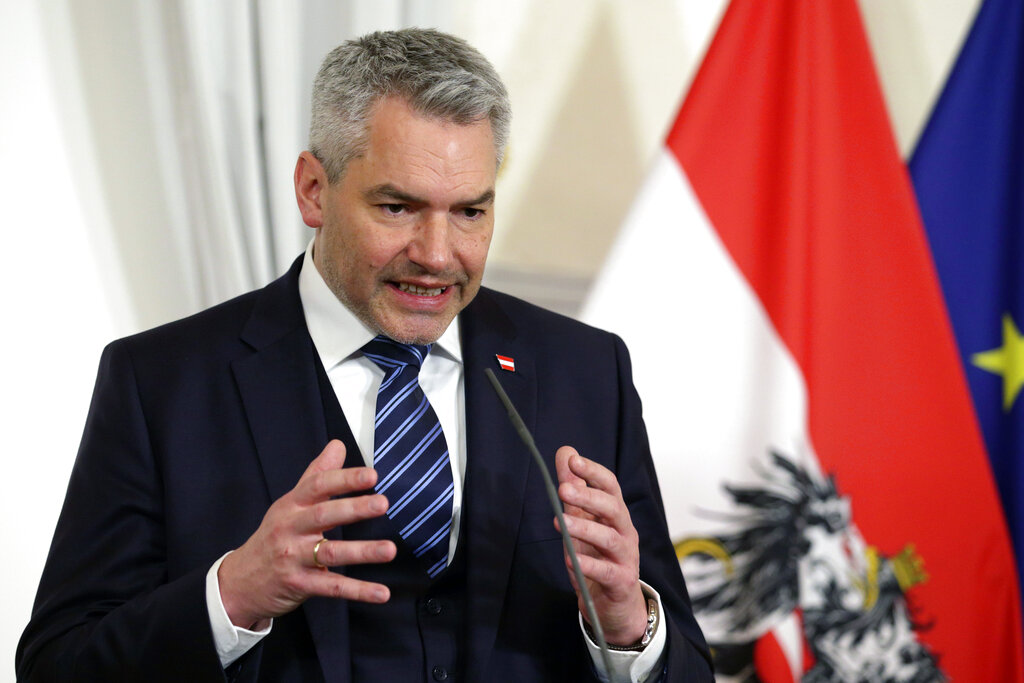The Freedom Party of Austria (FPÖ) has demanded the immediate resignation of Chancellor Karl Nehammer, accusing him of clinging to a chancellorship that the electorate rejected in last September’s federal elections.
Michael Schnedlitz, the party’s General Secretary and a member of the National Council, claimed that Nehammer’s refusal to step aside poses a serious threat to the country’s political stability.
Speaking from Vienna, Schnedlitz decried what he characterized as an ongoing attempt by legacy parties to exclude the FPÖ — despite its first-place finish — from forming the next government.
Tensions reached a breaking point when the liberal NEOS party withdrew from the so-called “loser traffic light coalition” negotiations with Nehammer’s Austrian People’s Party (ÖVP) and the Social Democratic Party of Austria (SPÖ) on Friday.
BREAKING: 🇦🇹 Talks to form a three-party coalition government in Austria have collapsed after the liberal NEOS party withdrew from negotiations.
The Austrian People’s Party (ÖVP), the Social Democratic Party of Austria (SPÖ), and NEOS had attempted to form a new administration… pic.twitter.com/VMgJnMoCzA
— Remix News & Views (@RMXnews) January 3, 2025After nearly 100 days of discussions, NEOS leader Beate Meinl-Reisinger announced that key differences between the ÖVP and SPÖ — reportedly the SPÖ’s aggressive tax policy — had made any workable agreement impossible. She stated that there was “no breakthrough” on important issues, adding that NEOS refused to think only as far as the “next election day.”
The collapse of these talks leaves Karl Nehammer’s claim to the chancellorship in jeopardy. Schnedlitz slammed Nehammer for, in his words, ignoring the FPÖ’s warnings about constructing a German-style “loser traffic light” government that, from the beginning, was destined to fail. Schnedlitz insisted that every hour Nehammer remains in office generates additional damage, calling upon him to face citizens immediately and to recognize that what truly motivates him is his own political survival.
“Should the Chancellor actor, who is on the ropes, now play even more games to form an unstable loser variant — either a two-way model with the SPÖ or a new loser traffic light with the Greens instead of NEOS — then I would like to make it clear to him: The people are fed up! It’s time for you to resign, Mr. Nehammer!” said Schnedlitz.
With the FPÖ currently polling at 35 percent and growing, there is a palpable sense that voters could severely punish the traditional parties if Austria heads back to the polls.
President Alexander Van der Bellen, too, has come under fire from Schnedlitz, who accused him of disregarding the popular vote by granting Nehammer the mandate to form a government. It was the Freedom Party that received the largest share of votes, yet Van der Bellen gave no invitation to FPÖ leader Herbert Kickl, claiming it was futile as the other parties had announced they would not entertain the idea of him leading the country.
The question that now hangs over Austrian politics is whether the president will persist in supporting Nehammer’s faltering attempts at coalition-building or open the door for the FPÖ, which by every indication would be willing — if not eager — to try forming a government.
The abrupt exit of the NEOS, which many believed was the linchpin of a viable coalition excluding the FPÖ, has sparked a number of possible scenarios. Some think the ÖVP and SPÖ might attempt to forge a grand coalition, though that razor-thin majority would lack resilience.
Others suggest a second traffic light, this time involving the Greens instead of the NEOS, might keep the FPÖ from governing but struggle to bridge ideological divides.
A third possibility, if Van der Bellen changes course, would invite Herbert Kickl to conduct coalition talks. Or, failing that, fresh elections may become unavoidable — an outcome that could see the Freedom Party bolster its support at the expense of the parties that kept it out.






